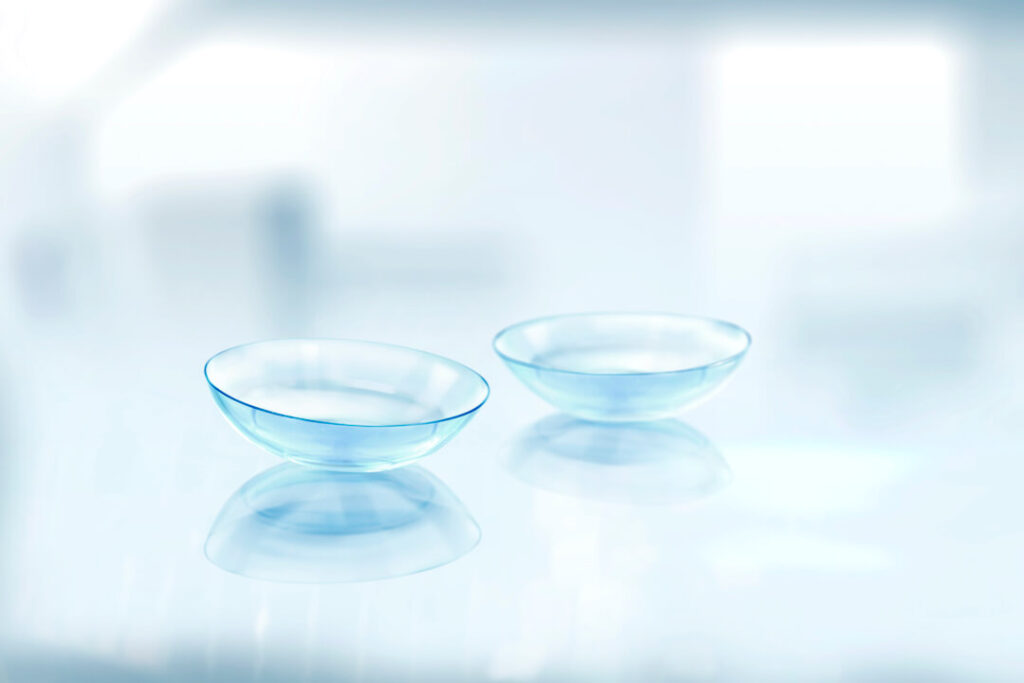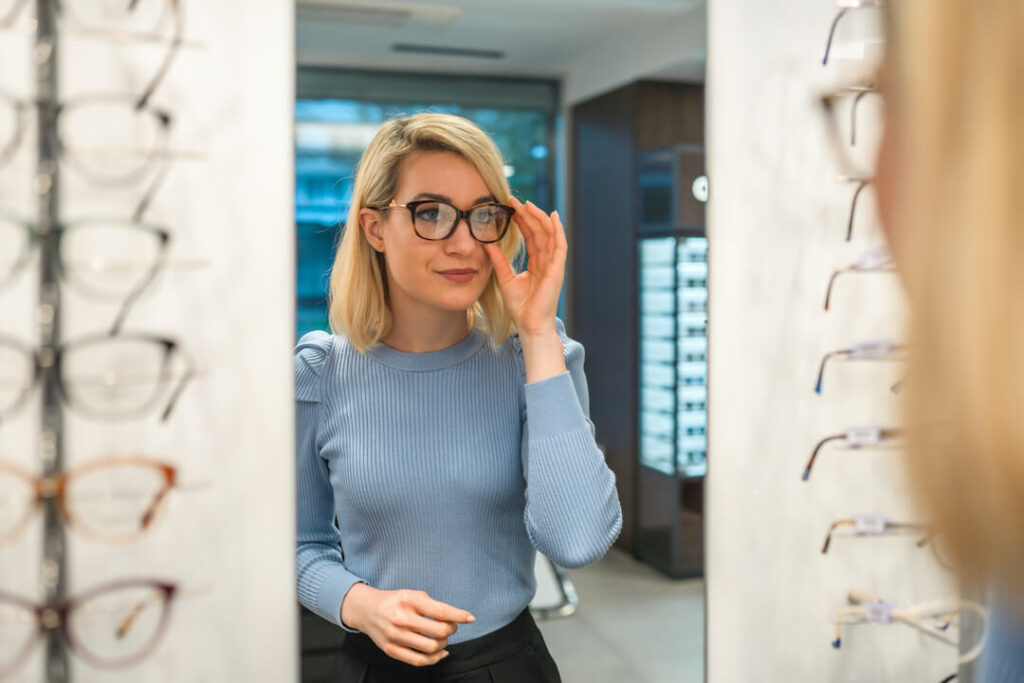Overnight contact lenses are a great option for some—but they aren’t for everyone
Imagine waking up with crystal-clear vision, free from the hassle of fumbling for your glasses or inserting contact lenses every morning. Contact lenses you can sleep in, also known as overnight contact lenses, make this dream a reality for many people. In this guide, we’ll explore the world of extended-wear contact lenses and orthokeratology (ortho-k) lenses, discuss their safety and risks, and help you select the best option for your unique vision needs.
If you are interested in saving on your contact lenses, explore coverage options from Linneo!
Table of Contents
Understanding Overnight Contact Lenses
Are contact lenses you can sleep in safe? Let’s investigate

Overnight contact lenses, also known as overnight contacts, are designed to be worn while you sleep, offering clear vision upon waking up.
There are two main types of overnight lenses: extended-wear contacts and ortho-k lenses. Extended-wear contacts are made from silicone hydrogel materials, allowing more oxygen to reach the eyes and enabling continuous daily wear for up to 30 days. Ortho-k lenses, on the other hand, are rigid lenses worn overnight to reshape the cornea and improve vision temporarily. If you’re considering wearing overnight contact lenses, consult with your eye care professional to determine the best option for you.
Both types of overnight lenses are approved by the FDA for continuous wear, ensuring their safety for most contact lens wearers.
Next, we will examine the specifics of both extended-wear contacts and ortho-k lenses, discussing their potential to provide overnight clear vision.
Extended Wear Contacts
Extended-wear contacts, also known as extended-wear contact lenses—are specifically designed with silicone hydrogel material—which allows for greater oxygen permeability and the ability to be worn continuously for up to 30 days. The duration for which contact lenses can be worn is determined by the lens type and your eyes’ tolerance for overnight wear, as evaluated by your optometrist.
To minimize potential risks when you choose extended wear contact lens or lenses, it is advisable to remove contact lenses before sleeping and swimming and to avoid smoke and expired lenses. Enjoy the benefits of extended-wear contacts with confidence by adhering to lens care guidelines and understanding the oxygen permeability of the lenses.
Ortho-K Lenses
Ortho-k lenses, also known as orthokeratology lenses, are designed to be worn overnight and temporarily reshape the cornea to improve vision. These lenses work by:
- Applying pressure to the center of the cornea leads to a flatter shape
- Thickening the edges of the cornea
- Shifting the corneal epithelium to the periphery
This allows the eye to assume a more natural shape, redirecting the light beam to its correct focus.
Initially, it’s suggested to wear ortho-k lenses every 24 hours, but as your cornea starts to retain the necessary shape for a further adjustment period of longer duration, you can extend the intervals to 1-2 days. Regular visits to your ophthalmologist are vital to monitor the adaptation to the correction and assess the health of your eye structures, even if there are no symptoms present.
Safety and Risks of Sleeping in Contact Lenses
While there are options for overnight lenses, they do come with more associated risks
While overnight use of contact lenses offers the convenience of clear vision without daytime lens wear, sleeping in contact lenses carries certain risks, such as infection, inflammation, and irritation. These risks can be managed with proper care and precautions, ensuring that your eyes stay healthy and comfortable.
Next, we will address common risks associated with sleeping with contact lenses and suggest ways to minimize these risks for the benefits of overnight wear.

Common Risks
Sleeping in overnight contact lenses may lead to corneal ulcers, dry eyes, and neovascularization. Wearing contact lenses overnight can obstruct oxygen flow from the blood vessels reaching the eyes, resulting in dryness and discomfort.
Maintaining proper lens hygiene and refraining from sleeping in contact lenses can help you avoid dry eye symptoms and other complications.
Reducing Risks
Mitigate the risks associated with overnight contact lenses by adhering to lens care guidelines. These include:
- Washing your hands before handling your lenses
- Cleaning and disinfecting them with a suitable lens solution
- Soaking them for the recommended duration
- Removing contact lenses before swimming to prevent bacterial invasion and potential infections
Avoiding smoking while wearing contact lenses overnight can also help mitigate risks, as smoke particles can cause irritation and increase the likelihood of dry eyes, corneal ulceration, and infection.
Lastly, using fresh lenses instead of expired ones can prevent irritation, dryness, and infection, ensuring the best possible vision and comfort.
Choosing the Right Overnight Contact Lenses for You
Talk to your doctor to help you make the best choice for overnight contact lenses
Selecting the right overnight contact lenses involves consulting with an eye doctor and considering options for different vision needs, such as astigmatism and presbyopia. Your eye care professional can help you determine the most suitable overnight lenses based on your individual factors and lifestyle.
Next, we will emphasize the role of an eye doctor’s consultation and discuss various options for overnight contact lenses catering to different vision requirements.
What to Expect From Your Consultation
An eye doctor is instrumental in determining the ideal overnight contact lenses for you, considering your personal factors and lifestyle. They will evaluate your condition and recommend appropriate ortho-k lenses.
During a contact lens exam, your eye doctor will:
- Evaluate your eye health
- Measure your vision sharpness
- Determine your prescription
- Assess your eye anatomy
- Consider your lifestyle and daily needs to recommend the most suitable overnight contact lenses
After they gather all of this information, they can make an expert recommendation on the right kind of contact lens
Options for Different Vision Needs
Overnight contact lenses are available for various vision needs, including astigmatism and presbyopia. Ortho-k lenses can gently reshape the cornea during sleep to correct the irregular curvature associated with astigmatism, providing clear vision the next day.
For individuals with presbyopia, certain overnight contact lenses, such as Acuvue Oasys, Biofinity Toric, and AIR OPTIX for Presbyopia, are designed for extended wear and offer comfortable, clear vision. By consulting with your eye care professional and considering your specific vision needs, you can find the best overnight contact lenses, including Air Optix Night and Day Aqua contact lenses, for you.
Caring for Your Overnight Contact Lenses
Proper care for overnight contact lenses is essential to ensure their effectiveness and maintain good eye health
To keep your overnight contact lenses in optimal condition, it’s important to clean and store them according to the manufacturer’s instructions. Recommended cleaning solutions include hydrogen peroxide solutions and saline solutions. Adhering to proper cleaning and storage techniques can help reduce the risk of impurities and infections.
When storing your contact lenses, ensure the following:
- Keep them in a clean, dry, and secure place overnight
- Avoid exposure to water
- Do not wear lenses that have been stored for 30 days or longer without re-disinfecting them.
Regular Check-ups
For overnight contact lens wearers, regular eye doctor visits are fundamental to ensure appropriate contact lens brands and fittings and good eye health. During these check-ups, your eye doctor will perform various tests to evaluate your candidacy for contact lenses, assess your vision with them, and monitor for any potential complications.
If you experience any eye discomfort, excessive tearing, vision changes, or redness of the eye while wearing overnight contact lenses, it’s important to remove your soft contact lenses and contact your eye care professional for an immediate check-up
Alternatives to Overnight Contact Lenses
Not a great candidate for contact lenses you can sleep in? There are other options

While overnight contact lenses offer many benefits, they may not be the best solution for not everyone. Alternatives to overnight contact lenses include glasses and daytime contact lenses, which can be chosen based on individual preferences and lifestyle.
Next, we will discuss the pros and cons of glasses and daytime contact lenses, assisting you in making a sound choice for your vision correction needs.
Glasses
Glasses provide a more natural vision experience and require minimal cleaning and upkeep compared to overnight contact lenses. They can be a good option for those with:
- dry or sensitive eyes
- astigmatism
- presbyopia
- eye conditions that make it difficult to wear contact lenses
Glasses are also often more cost-effective in the long term and can be a stylish accessory.
However, glasses may be obtrusive and heavier than contact lenses, making them less suitable for an active lifestyle or contact sports.
Daytime Contact Lenses
Daytime contact lenses offer a lighter and less obtrusive option than glasses and provide a wider field of vision. They are suitable for active people and contact sports but require more care and maintenance than glasses.
Daytime contact lenses can be worn for 14 to 16 hours daily and need to be cleaned and stored properly for up to six nights to reduce the risk of eye infection.
Frequently Asked Questions
Are there any contacts that you can sleep in?
Yes, there are contacts available that can be worn while sleeping. Examples include Acuvue Oasys with Hydraclear Plus, which is approved for continuous use for up to six consecutive nights of wear, and AIR OPTIX NIGHT & DAY AQUA contact lenses, which are FDA-approved for up to 30 days and nights of continuous wear. As with any contact lenses, it is important to always follow your eye doctor’s instructions regarding handling and caring for your lenses properly.
Are overnight contacts safe?
Overnight ortho-k contact lenses are customized to gently reshape the eye overnight, and studies have found that they carry no more risk than any other type of soft contact lens. Hygiene is important to prevent infections, but overnight contacts are safe overall.
Can you wear contact lenses overnight?
It is not recommended to wear contact lenses overnight, as only contact lenses designed and approved for extended or continuous wear can be worn safely. Accidental naps or occasional sleeping with contacts in can cause irritated eyes and serious eye infections. Always remove your contact lenses before bed if you think there is a chance you could fall asleep.
How often should I clean and store my overnight contact lenses?
Clean and store your overnight contact lenses every night to ensure their safety and health.
What are the common risks associated with sleeping in contact lenses?
Sleeping in contact lenses can lead to serious health risks such as corneal ulcers, dry eyes, and neovascularization.
In conclusion, overnight contact lenses can provide a convenient and effective solution for vision correction while you sleep. By understanding the differences between extended-wear contacts and ortho-k lenses, following proper lens care practices, and consulting with an eye care professional, you can make an informed decision about the best option for your unique and continuous correction needs. Whether you choose overnight contact lenses, glasses, or daytime lenses, remember that maintaining good eye health is essential for clear, comfortable vision.

